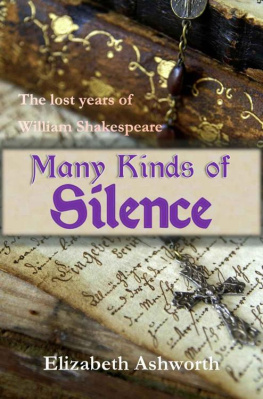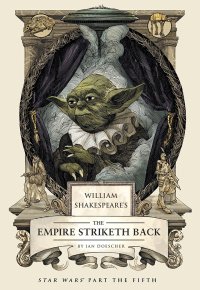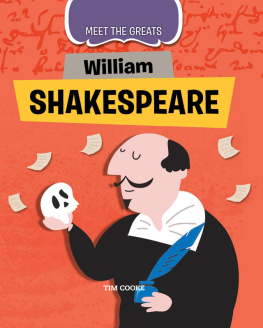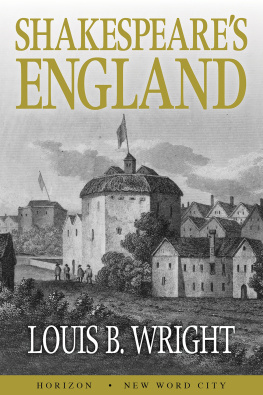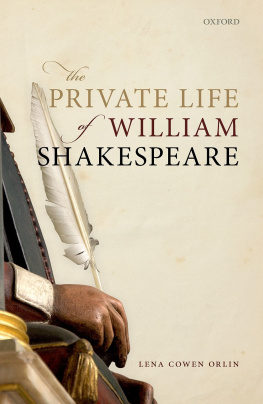Many Kinds of Silence
Many Kinds of Silence
by
Elizabeth Ashworth
Copyright 2014 Elizabeth Ashworth
Elizabeth Ashworth has asserted her right under the Copyright, Designs and Patents Act 1988 to be identified as the author of this work.
All rights reserved.
ISBN: 978-1500175221
Chapter One
I know not whether to depart in silence.
King Richard III
As the iron-shod hooves clattered on the oak boards that spanned the moat at Bushwood Hall, William wished that they could have approached with more reverence.
Are we there? asked his little brother Richard again. William could feel the small hands grasping the back of his best doublet and he felt Richards warm breath on his cheek as the child leaned forward to peer over his shoulder at the manor house. Is that it?
Yes, thats it. For goodness sake sit down before you fall, warned William as the horse skittered sideways at some unseen demon lurking amongst the green fronds at the edge of the water. It was one of two bay palfreys that his father had hired. He and his brother, Gilbert, had taken turns to ride with Richard behind them. His sister Joan had ridden pillion on their fathers mount and their mother, with the baby strapped across her chest, was on their own sturdy and reliable dun mare, Marchpane.
The courtyard at the centre of the hall was already busy and the bay snickered a greeting to one of its stable mates. William reined it in tightly and twisted to lower his brother to the ground, warning him to move away from the hooves of the unfamiliar horses. Then he dismounted and led the palfrey to the stall indicated by one of the stable boys. He tied it up, loosened the girth a little, but did not unsaddle it. A boy of about his own age secured the horse his father had ridden and he saw Gilbert leading Marchpane into the low barn. He exchanged a glance with his brother, but they did not smile.
At the manor house door, a liveried servant of Sir William Catesby asked his father for his name and then admitted them. William took Richard by the hand, wiped the dirt from his shoes and stepped over the threshold. An oak staircase, carved with a winding grapevine, led to the upper chambers. The little boy caressed the plump bunches of wooden grapes with his hand as he passed them and asked if there would be something to eat.
In a while, promised William. He sympathised with his brother. It had been a long journey without any breakfast and his own stomach was aching with the need for food and his throat craved a long drink of ale.
The great hall was as large as the Guildhall in Stratford where he had sometimes accompanied his father. High above him the timber rafters were thick and blackened where the vent above the hearth had once opened, but now there was a fireplace below a brick chimney, although the logs in the dog-grate were unlit.
A layer of fresh rushes, sprinkled with water mint from the river bank, cushioned the floor and quietened the crowded room, although the voices of those who had gathered were muted. William recognized one or two people and his gaze was returned with brief nods, whilst the younger children pressed themselves against the legs of the adults and gazed in awe at the half-remembered friends and neighbours in their best Sunday clothing. Surely so many people would be missed at the Protestant churches, worried William, and the names of those who had been seen riding away from the towns and villages so early in the morning would be noted by the religious spies.
Through a gap in the assembly he saw the table on the dais. It was covered with white linen cloths that reached to the floor. This was for no ordinary meal. In the centre of the table was an altar stone and a crucifix and adjacent was a credence table on it, arranged with precision, were the cruets which held the water and wine. William stared at the forbidden scene, his heart thumping in his chest at the daring of it, that it should be laid out like this in common sight.
Behind him a gust of wind rattled the latch of the outer door and he turned, expecting to see armed men burst in to arrest them. But apart from a heartbeats silence in the gentle lull of conversation there was no outward sign of fear.
Beside him, his mother lifted his youngest brother Edmund to her shoulder and rubbed his back as he began to cry. She pressed her lips against his tiny bonneted head and shushed him. William watched her and, as she met his gaze and smiled, he saw the same love for him evident on her face. He prayed that God would keep his family safe this day and in all the days to come. It would be hard to leave them.
His father grasped Williams shoulder with a hand that smelt faintly of animal skin and lanolin. He nodded towards Master Cottam, who was Williams teacher at the grammar school. The schoolmaster wore a frown and rubbed his hands together over the pile of cold logs. His gesture filled William with unease, although the man had praised him only the day before. As the other boys had rushed from the schoolroom at the end of their lessons, Master Cottam had called him back and asked if he would be attending this gathering at Bushwood Hall. The master had promised that he would take the opportunity to speak to Williams parents about the prospect of him continuing his education, and William hoped that Master Cottam had not forgotten. A university education at one of the colleges at Oxford or Cambridge was not possible for him. His father no longer had the money to fund such an expense and it was only his position as Mayor of Stratford that had ensured William the privilege of a grammar school education up until now. But Master Cottam had hinted that he could recommend William for a scheme whereby he might continue to learn something more appealing than the curing of skins and the stitching of gloves in his fathers yard.
The sound of the bolts being shot across the inside of the door hushed the subdued voices and William turned to watch as Sir William Catesby and his family came down the stairs. The congregation parted as their hosts walked the length of the hall. Sir Williams son, Robert, followed them with the censer swinging in his grasp. The thick sweet scent began to rise in a spiral towards the vent in the ceiling, as if wafted heavenwards by the breath of the congregation, and the men and women crossed themselves as the priest entered.
So this was him, thought William, as he studied the man. This was Father Edmund Campion, who had come to England as a missionary to rescue the unbelievers. His dark eyes were watchful above prominent cheekbones, emphasised by his close-cropped hair. His sparse body seemed dwarfed by the finery of the blue velvet vestments which he wore. He paused at the credence table and washed and dried his hands carefully before sprinkling holy water on the altar and then over the heads of the people.
Our help is in the name of the Lord!
Who made heaven and earth, they replied.
The wind rattled the door again but the noise was lost in the voices of the men and older children who formed the choir. Kyrie eleison; Christe eleison; Kyrie, eleison. William listened, allowing his senses to imbibe every sound as the music filled him with an emotion he struggled to contain. He felt safe now. He felt loved.
Dominus vobiscum.
Et cum spiritu tuo.
William grasped his rosary between his fingers as the priest began to pray. This was what mass should be like, celebrated openly with others who truly believed rather than in secret corners of hidden rooms. He raised his eyes and followed the trail of incense upwards, carrying the priests intercessions to God. They should be in a church, with paintings of the Bible stories on the walls and images of the saints on the rood screen and although the priest spoke of forgiveness and reconciliation, William was tempted to curse those who had made his father weep after he had signed the agreement for the images to be whitewashed over in the chapel of the Guildhall. He prayed silently that the excommunicated queen would soon be cast down from her mortal throne and that a monarch of Gods choosing would rule them again and that the true and holy church would be restored.
Next page
